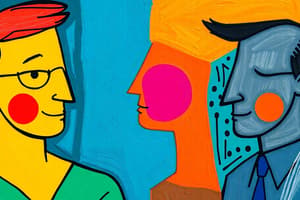Podcast
Questions and Answers
What is the term used to describe well-being that is based on personal satisfaction and purpose?
What is the term used to describe well-being that is based on personal satisfaction and purpose?
- Physical well-being
- Subjective well-being (correct)
- Material well-being
- Objective well-being
Which dimension of well-being refers specifically to financial and resource availability?
Which dimension of well-being refers specifically to financial and resource availability?
- Emotional well-being
- Mental well-being
- Social well-being
- Material well-being (correct)
What component of love involves emotional closeness and personal connection?
What component of love involves emotional closeness and personal connection?
- Passion
- Commitment
- Attraction
- Intimacy (correct)
How is love characterized in terms of its relationship to culture?
How is love characterized in terms of its relationship to culture?
Which of the following best describes commitment in a loving relationship?
Which of the following best describes commitment in a loving relationship?
How is love described as a social phenomenon?
How is love described as a social phenomenon?
Which of the following is NOT considered a basic emotion?
Which of the following is NOT considered a basic emotion?
What role do neurotransmitters play in the experience of love?
What role do neurotransmitters play in the experience of love?
Which theory describes love in terms of unconscious desires and instincts?
Which theory describes love in terms of unconscious desires and instincts?
Which aspect of love is considered a physiological response?
Which aspect of love is considered a physiological response?
Flashcards are hidden until you start studying
Study Notes
Well-being
- Objective Well-being: Evaluated through environmental elements; measurable presence or absence.
- Subjective Well-being: Pertains to personal experiences of satisfaction, meaning, and purpose; closely linked to happiness.
- Dimensions of Well-being:
- Physical: Biological health and physical fitness.
- Emotional: Presence of positive feelings and mood stability.
- Mental: Clarity of thought and healthy mental processes.
- Material: Adequacy of financial and other resources.
- Social: Quality of interactions and relationships with others.
Love, Intimacy, and Relationships
- Love: A complex phenomenon involving emotional and cognitive inclinations; characterized by behaviors promoting cohesion.
- Intimacy: Emphasizes deep emotional closeness and personal connection.
- Passion: Relates to sexual and romantic attraction.
- Commitment: Decision to maintain a loving relationship.
- Relationship: Social bonds between individuals, formed through communication and interaction.
Love as a Human Experience
- Cultural Universal: Love is experienced similarly across different times and cultures; transcends geographic and socio-cultural boundaries.
- Social Phenomenon: Love manifests through communication and relational interactions; relies on culturally understood symbols.
- Emotion: Physiological responses evaluated psychologically; includes basic and complex emotions.
- Neurobiological Event: Love can be studied through neural processing, involving electrical signals and neurotransmitters.
Theorizing Love
- Psychodynamic Theory: Explores desires and motives influenced by life and death instincts, including themes of infidelity and relationship difficulties.
Senses and Sexuality
- Primary Senses:
- Vision: Dominant sense, influenced by visual culture and memory.
- Olfaction: Sense of smell plays a role in sexual response, despite limited olfactory capabilities in humans.
- Touch: Integral to intimacy; skin is sensitive with nerve endings. Contains primary and secondary erogenous zones that respond to touch.
- Auditory Experience: Language and sounds contribute to social interactions, including verbal expressions of affection.
Sexual Behavior
- Definition: Actions interpreted as expressions of sexual motivations; context is key for meaning.
- Types of Sexual Behaviors:
- Auto-erotic: Self-directed activities, like masturbation.
- Homoerotic: Behaviors directed toward the same sex.
- Heteroerotic: Behaviors directed toward the opposite sex.
- Reproductive Aim: Copulation is essential for reproduction; includes different positions and can encompass both copulatory and non-copulatory behaviors.
Sexual Response Cycle
- Phases: Following Master and Johnson's model, sexual response consists of four phases, starting with excitement aimed at facilitating erection in males for effective copulation.
Studying That Suits You
Use AI to generate personalized quizzes and flashcards to suit your learning preferences.




